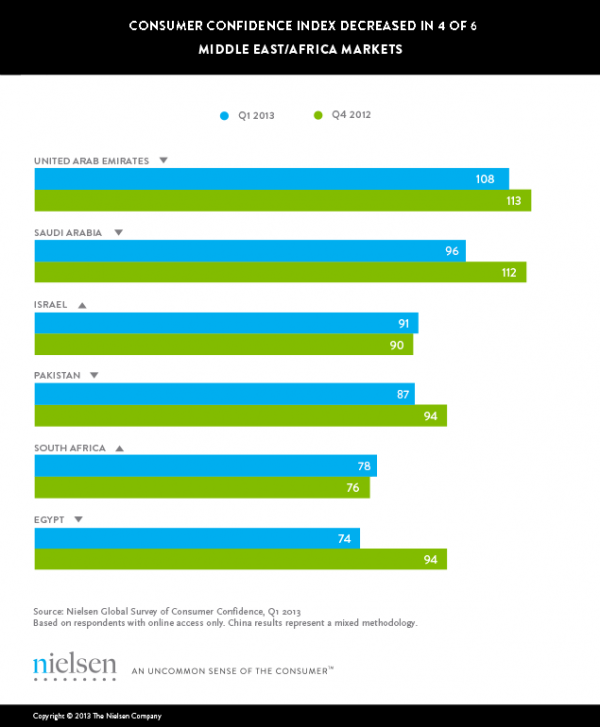Consumer confidence declined in four of six Middle East and Africa markets in Q1 2013, reflecting negative sentiments about personal finances and job prospects, according to findings from the Nielsen Global Survey of Consumer Confidence and Spending Intentions. Egypt and Saudi Arabia each reported double-digit confidence declines from Q4 2012, as the index levels for these two markets fell 20 and 16 points, respectively. Confidence in Pakistan declined seven index points to a score of 87, and confidence in United Arab Emirates dropped five index points to 108, which was the highest index reported in the region. Confidence in South Africa increased two index points to 78 and confidence in Israel rose one point to a score of 91.
The Nielsen Global Survey of Consumer Confidence and Spending Intentions measures consumer confidence, major concerns and spending intentions among more than 29,000 respondents with Internet access in 58 countries. Consumer confidence levels above and below a baseline of 100 indicate degrees of optimism and pessimism.
Six-in-10 Middle East/African respondents believed that local job prospects over the next 12 months would be bad/not so good, which was an increase of nine percentage points from Q4 2012. Just over half (52%) of respondents said the state of their personal finances was in good shape, down from 58 percent in Q4 2012. Sixty-seven percent of Middle East/African respondents were not confident they will be able to spend in the year ahead.
One-in-four respondents (26%) in the region said they had no spare cash after paying for living expenses—an increase of 5 percentage points from the end of last year. Cash-strapped respondents planned to cut back on out-of-home entertainment and new technology purchases. The number of respondents in the region who felt mired in a recession rose four points quarterly to 77 percent, the highest among all of the regions that Nielsen measures.
“Egypt’s decline in consumer confidence comes as no surprise, as the country’s unsettled political conditions and civil unrest continues,” said Rammohan Rao, managing director, Nielsen Egypt. “Labor strikes in Egypt are increasing because the revolution and several factories were forced to shut down due to protests. Tourism has also been negatively affected as have foreign investments, consuming Egypt’s foreign reserves, which are down nearly two-thirds from before the uprising. With little money to spend and high inflation, Egyptians are forced to implement further belt-tightening measures in 2013.”
Other findings include:
- Spending intentions in North America have increased since the beginning of the Great Recession in 2008.
- Confidence in key Asian export economies rebounded strongly in Q1.
- Consumer confidence in central and northern Europe increased in Q1, surpassing year-ago levels.
- Latin Americans reported spending restraint and the region’s confidence dipped two points in Q1.




































